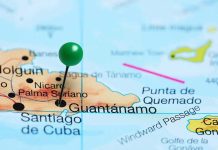
A high-ranking aide to Massachusetts Governor Maura Healey allegedly turned a state office building into his personal cocaine distribution hub, using his government position to orchestrate one of the most brazen public corruption schemes in recent memory.
Story Highlights
- LaMar Cook, deputy director of Gov. Healey’s Western Massachusetts office, arrested for trafficking 21 kilograms of cocaine
- Cocaine packages were delivered directly to the Springfield State Office Building where Cook worked
- Investigation began after suspicious packages intercepted at Hotel UMass, Cook’s former workplace
- Cook terminated immediately and held without bail after pleading not guilty to trafficking and weapons charges
From Hotel Director to Drug Kingpin Allegations
LaMar Cook’s alleged criminal enterprise began unraveling on October 10, when authorities intercepted two suspicious packages containing 13 kilograms of cocaine at Hotel UMass in Amherst. Cook had previously served as director of the hotel, giving him intimate knowledge of its operations and security protocols. This connection would prove crucial as investigators pieced together what prosecutors describe as a sophisticated trafficking operation that exploited both his former and current government positions.
The brazenness of Cook’s alleged scheme becomes clear when examining his dual roles. As deputy director of Governor Healey’s Western Massachusetts office, Cook served as a liaison between regional counties and the state’s highest executive office. Simultaneously, prosecutors allege, he was using his access to state facilities to receive and distribute massive quantities of cocaine throughout the region.
The State Office Building Sting Operation
Two weeks after the Hotel UMass seizure, law enforcement orchestrated a controlled delivery that would seal Cook’s fate. On October 25, undercover officers delivered a package containing eight kilograms of cocaine directly to the Springfield State Office Building where Cook maintained his government office. The audacity of using a state facility as a drug drop-off point illustrates the profound breach of public trust at the heart of this case.
Investigators conducted a methodical search of Cook’s office on October 27, gathering evidence that would support not only drug trafficking charges but also allegations of illegal firearm and ammunition possession. The following evening, Cook was arrested in his car in Springfield, bringing an end to what prosecutors describe as a major trafficking operation that moved 21 kilograms of cocaine through government and quasi-government facilities.
Political Fallout and Administrative Response
Governor Healey’s administration moved swiftly to contain the damage, terminating Cook immediately upon his arrest and pledging full cooperation with law enforcement. A spokesperson for the governor condemned Cook’s alleged conduct as “unacceptable” and representing “a major breach of the public trust.” The response reflects the serious political implications for an administration now forced to explain how such extensive criminal activity allegedly occurred under its watch.
The case raises uncomfortable questions about vetting procedures and oversight mechanisms within state government. Cook’s position required significant trust and provided substantial access to state resources and facilities. His alleged exploitation of these privileges for drug trafficking purposes exposes potential vulnerabilities in how Massachusetts screens and monitors high-level government employees, particularly those with liaison roles that require considerable autonomy.
Ongoing Investigation and Broader Implications
Cook appeared for arraignment on October 29, pleading not guilty to all charges before being held without bail pending further hearings. District Attorney Anthony Gulluni’s office indicates the investigation continues, with additional charges possible as authorities examine the full scope of the alleged trafficking network. The methodical approach suggests prosecutors believe Cook’s operation may have been more extensive than initially apparent.
The case represents a rare intersection of high-level government corruption and major drug trafficking charges. While Massachusetts has prosecuted public officials for various forms of corruption, allegations of this magnitude involving direct participation in narcotics distribution are highly unusual. The systematic use of government facilities for criminal enterprise amplifies both the legal jeopardy Cook faces and the reputational damage to state government institutions that pride themselves on public service and integrity.







